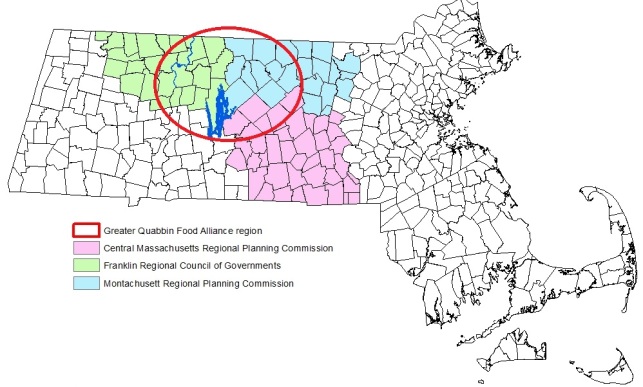In 2013, a small group of farmers, community organizations, land trusts, and planners convened in the North Quabbin to discuss ways they might work together to address the food system challenges in our communities — including the agricultural economy, food access and local food procurement, health, farmland conservation, and education.

The group felt that while there were already many organizations addressing these issues, communities could benefit from coming together to share information about what projects they are working on, what resources they have, and what resources they need.
Through these conversations, the Greater Quabbin Food Alliance was born, fostering new cross-sector dialogue, information-sharing, and the emergence of new partnerships.
Examples of collaborative projects by Food Alliance members:
- Partnership between Mount Grace Land Conservation Trust and the North Quabbin Community Co-op to create a community market in downtown Orange: Quabbin Harvest, similar to the East Quabbin Land Trust partnership with the Petersham Country Store.
- Increased information-sharing between three regional planning commissions working on food systems planning and farmer needs assessments, including the Franklin County Farm and Food Study questionnaire and the Central Mass Buy Local Campaign.
- Increased networking between food banks and pantries to increase the availability of locally grown food.
The Greater Quabbin Food Alliance is currently housed at and fiscally sponsored by Mount Grace Land Conservation Trust in Athol, and includes many partners across the region.
The Big Picture
The six New England states currently only produce 12% of the food we consume. According to the New England Food Vision, we can reasonably produce 50% of our food by 2060 – but in order to do that, our communities will need to increase ongoing efforts to:
- Protect farmland

- Support farmers
- Support businesses tied to the agricultural economy
- Make healthy, local food accessible for all
- Address infrastructure gaps (for food distribution, processing, storage, preparation, waste recovery)
- Strengthen connections within and among communities to share assets and needs
Let’s make it happen!